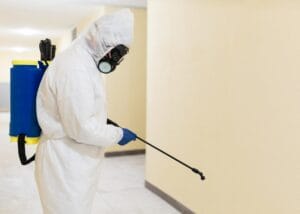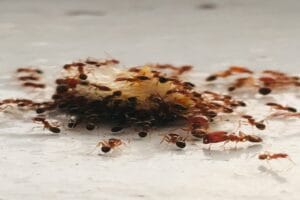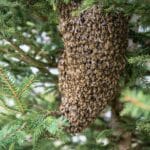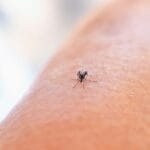Many homeowners overlook the importance of seasonal pest control in maintaining a safe and comfortable home. Different pests are prevalent in different seasons, and each pest requires a unique method of control. Let’s explore how to prepare for the pests that each season brings.
Main Points
- Seal any possible entry points to your home in spring to keep pests out.
- Take care of your yard and get rid of any standing water in summer to prevent insects from multiplying.
- Store firewood correctly and seal any cracks in your home’s exterior in fall to prevent pests from moving in for the winter.
- Keep your home tidy and store holiday decorations properly in winter to avoid providing a home for pests.
- Regularly inspect your home and consider hiring a professional pest control service if you have an infestation.
Spring Cleaning: Protect Your Home from Emerging Pests

When the snow melts and the flowers start to bloom, pests come out of their winter hibernation. Spring is the time to start preparing your home for a potential onslaught.
Find and Block Entrance Ways
First order of business, let’s stop them in their tracks. Bugs and rodents can squeeze through the smallest of spaces, so a comprehensive check of your home’s exterior is necessary. Search for cracks in the foundation, spaces around windows and doors, and holes around utility pipes. Once you’ve found these problem areas, block them with suitable materials such as caulk, steel wool, or weather stripping.
Keep in mind, it’s not just about preventing pests from getting in; it’s also about retaining heat, which can help you save on energy costs.
Here’s an easy-to-follow checklist to ensure you don’t miss anything:
- Inspect your home’s foundation and outside walls for any cracks.
- Look at windows and doors for any gaps.
- Check the roof for any loose shingles or openings.
- Examine utility pipes and vents for any unsealed spaces.
Spring Clean Your Outdoor Spaces
Spring cleaning isn’t just for inside your home. Make sure to examine your outdoor spaces, especially the ones that are directly next to your home. Remove any debris like leaves or fallen branches, which can be a breeding ground for insects and rodents. Cut back any trees and shrubs that are touching your home’s exterior, as they can act as a pathway for pests to get inside.
Cleaning Tips Before the Season Begins
Ensure your screens are in good condition to keep flying bugs out before you start enjoying the fresh spring air. It’s also a great opportunity to thoroughly clean areas where food is kept, such as pantries and kitchen cabinets, to get rid of crumbs and residue that might draw ants or other bugs.
Now, let’s delve into some specific scenarios of what could happen if you don’t take care of these springtime preparations:
Just last year, I overlooked the seal on my kitchen window. By the time I noticed, a legion of ants had already made my pantry their new home. It took a few weeks to completely eliminate them, and they spoiled a lot of food along the way.
Don’t let yourself fall into this trap. A bit of elbow grease in the spring can save you from a world of trouble down the line. For a comprehensive approach, check out our spring pest-proofing guide to ensure a pest-free home.
Next up is summer, where the temperature rises, and so does the activity of bugs.
Summer Shield: How to Protect Your Home from the Heat and Pests
When the temperature starts to climb, pests such as mosquitoes, ants, and wasps become more active. These pests are more than just a nuisance; they can also pose serious risks to your health and your home.
Consistent Garden and Boundary Inspections
Maintain your lawn by mowing regularly and keeping your shrubs well-pruned. Pests love to hide and reproduce in long grass and dense greenery. Eliminate any areas of still water on your land, as this is an ideal breeding environment for mosquitoes.
Food and Waste Management Tactics
Summer barbecues and outdoor meals are great, but leftovers and crumbs are invitations for ants and other insects. Make sure to clean up immediately after eating and keep tight lids on trash cans. If composting, ensure your compost bin is well managed to not attract unwanted critters.
Keeping Bugs at Bay
Put up some sturdy screens on your windows and doors to keep out flying pests. You can also try natural bug repellents like citronella candles or essential oils such as eucalyptus and lavender. If you live in an area with a high bug population, you might want to consider setting up bug traps or hiring a pest control company.
Autumn Alert: Halting Household Pests

With the onset of autumn, many pests are in search of a warm place to weather the winter. If you’re not vigilant, your home could become their haven.
Examine and Fix Home Exteriors
Reexamine the exterior of your home, similar to what you did in the spring. Fix any damage that might have been caused by summer storms, and close any new gaps or cracks. This is essential because pests are on the lookout for any chance to get inside before winter.
Get Your Home Ready for Bugs Looking for Warmth
When the weather turns cold, you and the bugs want to be inside where it’s warm. To keep them out, try to keep your home clean and clutter-free. Bugs, like spiders and cockroaches, love to hide in clutter.
- Make sure to tidy up your house, particularly in areas that are dark and rarely disturbed such as basements and attics.
- Make it a habit to vacuum often, focusing on corners and underneath furniture.
- Store food in airtight containers and immediately clean up any messes.
Here’s a real-life example that shows the importance of these steps:
My neighbor only discovered a minor leak in their attic when they stumbled upon a swarm of silverfish and other pests that thrive in damp conditions. The infestation had grown out of control because the pests had a water source and ample undisturbed space to breed.
Storing Your Items to Keep Pests Away
When you’re packing away your summer items, use plastic containers that have lids that fit tightly. Pests such as rodents and cockroaches are attracted to cardboard boxes. Also, don’t put items right against walls or touching the floor, as this can create the perfect environment for pests to hide and nest.
Winter Warning: Maintain a Pest-Free Cozy Home

Contrary to popular belief, pests don’t just vanish during the winter. In the warmth of your home, they find the perfect environment to live and breed without you noticing.
Checking and Maintaining the Inside of Your Home
Make sure to frequently check inside your home for any signs of pests. This can include droppings, nests, or even damage to furniture and wiring. Be sure to check areas of your home that are not frequently used, such as the basement, attic, and garage.
Crucially, deal with any problems as soon as they arise. A minor issue can rapidly escalate into a major infestation if not dealt with promptly.
Chilly-Climate Storage and Decoration Warnings
While you’re hanging the tinsel and stringing the lights, keep an eye out for any critters that might have made your stored decorations their home. Unpack your festive decor outside and give it a thorough once-over before bringing it into your home. And when the holidays are over, be sure to store your decorations properly to keep pests from nesting in them.
Keeping an Eye Out All Year
The best way to keep pests at bay is to stay alert. Make sure to check your home regularly throughout the year, and act as soon as you notice something wrong. The sooner you deal with a pest problem, the easier it will be to handle.
Professional Guidance: Seasonal Tips from the Pros

Finally, let’s conclude with some professional guidance that can assist you in maintaining a pest-free home throughout the year.
Monthly Home Inspection Checklist
Make a monthly checklist for home inspections. Include things like looking for cracks and gaps, checking for pest signs, and evaluating any wet areas that could draw pests. Be strict with your checklist—it’s your first line of defense.
Seasonal Deep-Cleaning Routines
Every season, make sure to thoroughly clean your home. This isn’t just for the sake of cleanliness, it’s also to disrupt any potential hiding spots for pests and decrease the likelihood of them making a home there.
And here’s a final tip:
Never underestimate the power of prevention. It’s much simpler and less expensive to prevent an infestation than to get rid of one. Regular upkeep and vigilance are crucial in keeping your home free of pests.
By staying ahead of the game, you can ensure your home remains safe and cozy all year long with effective pest control strategies.
In terms of safeguarding your home from pests, it’s critical to know when you may need some additional assistance. Although a lot of preventative steps can be taken on your own, there are moments when it’s best to bring in the experts.
When You Should Call a Pest Control Professional
If you’ve tried every trick in the book and you’re still seeing pests, or if you’ve discovered a potentially harmful pest like termites or a major rodent problem, it’s time to get the professionals involved. Pest control professionals have the experience, tools, and know-how to safely and effectively get rid of pests in your home.
- Indications of pest-caused structural harm
- A swiftly expanding infestation that’s tough to manage
- Existence of health-endangering pests such as rodents or ticks
- Repetitive pest issues despite employing store-bought solutions
Keep in mind, the more you delay, the more challenging and costly it can get to manage an infestation. Experts can also provide guidance on how to avoid future infiltrations.
Next, we’ll address some commonly asked questions that can keep you informed and prepared to handle pests all year long.
FAQs
Knowing the usual worries about pests and how to handle them can help you get a leg up in maintaining a secure, pest-free home. Here are some of the most common questions and their answers.
What Pests Should You Expect in Each Season?
During spring, be on the lookout for ants, termites, and insects that sting. Flies, mosquitoes, and bed bugs are common in the summer. Rodents and spiders often look for shelter in the fall, and during winter, you may find mice and cockroaches in your home. Being aware of the pests that are common in each season can help you prepare and prevent them from infesting your home.
How Regularly Should I Check My Home for Pests?
You should check your home for pests at least once a month. Look for signs of pests, such as droppings, nests, or damage to your property. Seasonal changes often bring new pest challenges, so be extra vigilant as the weather shifts.
Do DIY Pest Control Methods Work?
DIY pest control can work for small issues or as a way to prevent pests. But for bigger infestations or more harmful pests, you usually need professional pest control to make sure the problem is completely taken care of.
What Should I Do If I Discover Signs of an Infestation?
If you discover signs of an infestation, it is important to act quickly. Try to identify the pest if you can, and use the appropriate methods to control it. This might include setting traps, using pesticides, or sealing off entry points. If the infestation is severe, you may need to contact a professional pest control service.
Can Seasonal Decorations Hide Pests?
Yes, seasonal decorations can hide pests, particularly if they’re kept in attics, basements, or garages. Check and clean decorations before bringing them into your living areas. Keep them in sealed containers to stop pests from nesting.
The HTML content is empty. There is no AI content to rewrite.







